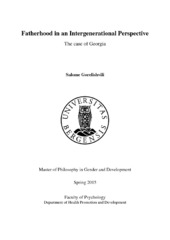Fatherhood in an Intergenerational Perspective - The case of Georgia
Master thesis
Permanent lenke
https://hdl.handle.net/1956/10075Utgivelsesdato
2015-06-01Metadata
Vis full innførselSamlinger
Sammendrag
The study explores Georgian fathers' perceptions on fatherhood and identifies their everyday fathering practices. Considering that fatherhood is a fluid concept, the research explores what a good father" is according to two generations of fathers, young and old. Similarities and differences between these generations are analyzed in the thesis. The study also explores youth's and mothers' opinions on fatherhood. Empirical findings were generated using solely qualitative research methods. Data was collected by the method of in-depth interviews with fathers, 16 in total. Eight of the fathers belonged to the young generation, and the rest were elder fathers. For the purpose of obtaining youth's viewpoints, two focus group discussions were held. In addition, eight short interviews were conducted with mothers. The empirical findings were analyzed by using different conceptual frameworks: West and Zimmerman's concept of doing gender" social cognitive theory on gender identity development" as developed by K. Bussey, and R. Connell's theory of masculinity". The research concludes that strong patriarchal norms and gender stereotypes prevail in Georgian society and are expressed in similar ways by both generations of fathers as well as by mothers and the youth. Breadwinning is assumed to be the primary duty of a good father, while women continue to cope with caregiver and employee roles. According to the study, gender perceptions are similar in both generations of fathers. The research, however, also points that masculine behavior is less prevalent in the old generation of fathers. The study argues that due to existing hegemonic masculine values, fathers are not yet ready to include caregiving duties in their lives. However, the study observes youth's and mothers' urge for emotionally involved fathers; fathers who will spend more time with their children and establish warmer relationships. Considering the major findings, the research suggests that existing gender stereotypes should be challenged by raising awareness among different parts of the community. Parallel to this, revision of family policies and parental leaves are strongly recommended.
